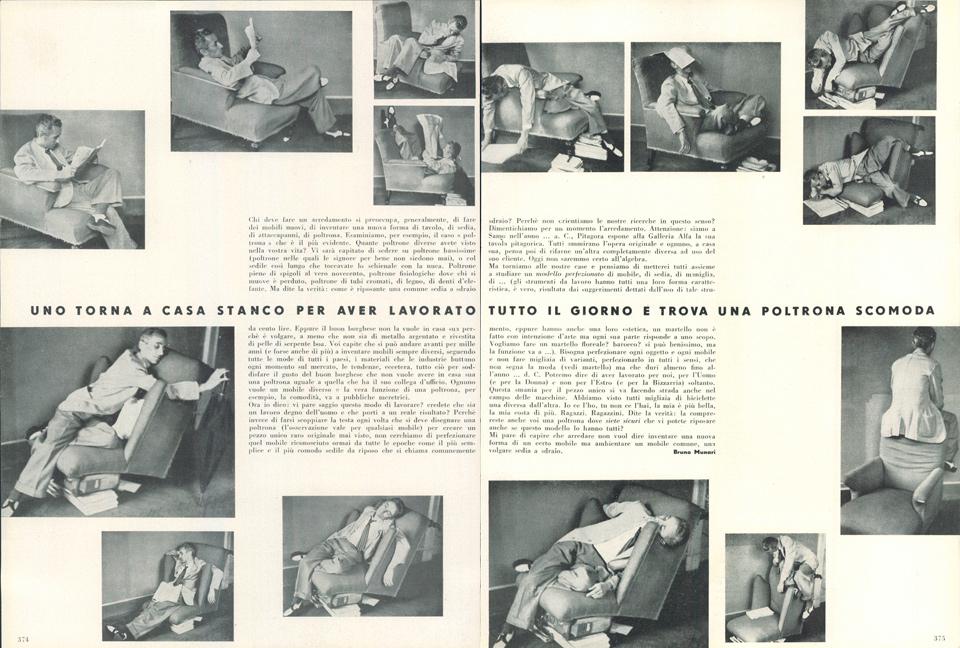Well done everyone who had a go at our quiz about pairing up adjectives with the nouns that they describe and their respective articles.
We asked you to translate each of the sentences below, adding the article (il, i, lo, gli, la, or le), and picking the correct adjective from the box at the bottom of the page and then pairing it with the appropriate noun.

Bruno Munari, Ricerca di comodità in una poltrona scomoda, 1950
Let’s see how you got on.
1. sole (masculine; sun)
il sole abbagliante = the dazzling sun
2. ombrellone (masculine; beach umbrella)
l’ombrellone rotto = the broken beach umbrella
3. mare (masculine; sea)
il mare è calmo = the sea is calm
4. gelato (masculine; ice cream)
un ottimo gelato = a very good ice cream
5. sedia sdraio (feminine; deckchair)
la sedia sdraio è scomoda = the deckchair is uncomfortable
6. sabbia (feminine; sand)
la sabbia è fine = the sand is fine
7. spiaggia (feminine; beach)
una bellissima spiaggia bianca = a very beautiful white beach
8. zoccolo (masculine; clog)
gli zoccoli sono comodi = the clogs are comfortable
9. costume (masculine; swimsuit)
il costume nuovo = the new swimsuit
10. bikini (masculine singular; bikini)
il bikini bianco = the white bikini

Hold that pose, treasure, you’re beautiful …
11. calzoncini (masculine; shorts)
i calzoncini rosa = the pink shorts
12. canottiera (feminine; vest)
la canottiera blu = the blue vest
13. canotto (masculine; dinghy)
il canotto è grande = the dinghy is big
14. pomeriggio (masculine; afternoon)
un pomeriggio molto afoso = a very sultry afternoon
15. salvagente (masculine, unchangeable; lifebelt)
i salvagente sono sgonfi = the lifebelts are deflated
16. bibita (feminine; drink)
le bibite ghiacciate = the icy drinks
17. crema solare (feminine; suncream)
la crema solare appiccicosa = the sticky suncream
18. anguria (feminine; watermelon)
un’anguria veramente rinfrescante = a really refreshing watermelon
19. bagnino (masculine; lifeguard)
un bagnino abbronzato = a tanned lifeguard
20. occhiali da sole (masculine; sunglasses)
gli occhiali da sole sono graffiati = the sunglasses are scratched
21. scoglio (masculine; rock)
lo scoglio piatto = the flat rock
La Scatola di Aggetivi – The Box of Adjectives
|
afoso = sultry
rinfrescante = refreshing
ghiacciato = icy
grande = big
bellissimo = very beautiful
piatto = flat
fine = fine
abbronzato = tanned
abbagliante = dazzling
blu = blue
|
rotto = broken
graffiato = scratched
rosa = pink
appiccicoso = sticky
sgonfio = deflated
nuovo = new
bianco = white
comodo = comfortable
ottimo = very good
calmo = calm
scomodo = uncomfortable
|
Coming soon: A second quiz on the same theme, but this time using irregular nouns. Stay tuned!







Comments:
Joan Engelhaupt:
Thank you, Geoff. I do have two questions (reflecting some of the ones I got wrong): do the adjectives of color remain the same regardless of number and gender? Also, how can I know when the adjective should precede the noun, as in #7?
Serena:
@Joan Engelhaupt Salve Joana!
Most colours colour adjectives change their ending such as rosso, verde, marrone, etc. Some colours do not change their ending for two possible reasons: 1. they are foreign words such as blu 2. They are names of flowers such as rosa or viola.
AS for your second question: “how can I know when the adjective should precede the noun, as in #7”, well in question 7 the correct answer is “una bellissima spiaggia bianca” because colours come after the noun. In questions 4 we can have both: un ottimo gelato/un gelato ottimo, the meaning will stay the same, but the emphasis will move from gelato to ottimo. The same in question 9.
You can find more detailed explanations in these 3 articles:
https://blogs.transparent.com/italian/adjective-order-in-italian/
https://blogs.transparent.com/italian/adjectives-and-their-position/
https://blogs.transparent.com/italian/a-big-brush-or-a-great-brush/
Saluti da Serena
Jacqui:
Grazie, un quiz molto utile
Michael Stevens:
Per il 14 ho scritto, “un pomeriggio afosissimo,” e per il 18 ho scritto, “un anguria proprio rinfrescante.” Sono totalmente in errore? 🙂
Serena:
@Michael Stevens Salve Michael! It’s perfectly correct to say “un pomeriggio afosissimo” instead of “un pomeriggio molto/proprio afoso”. The suffix -issimo is interchangeable with “molto”, “tanto”, “proprio” or “davvero”.
Saluti da Serena